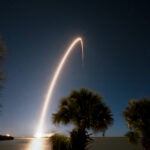
NASA requests $1.2 billion for the Commercial Crew spaceflight program (CCP) in FY '16, a nearly 54 percent increase from the $805 million that was enacted in FY ’14, according to budget documents released Monday.CCP is the program to allow the United States to return delivering its astronauts to the International Space Station (ISS). NASA currently rents seats from Russia to get astronauts to and from ISS. Though the request for Commercial Crew this year is a big boost, NASA…













